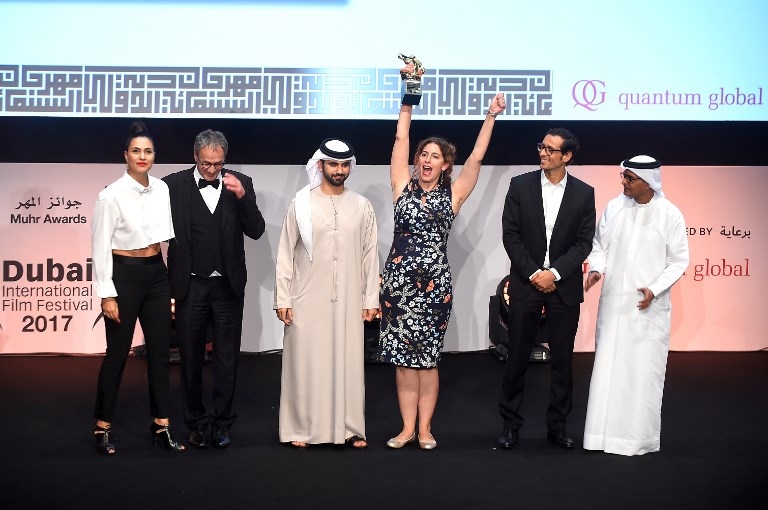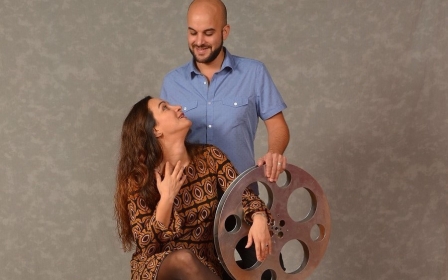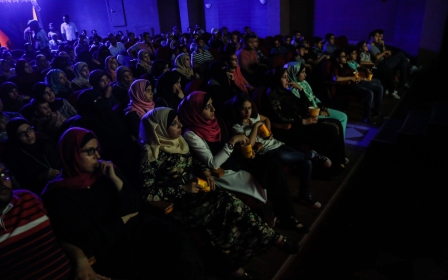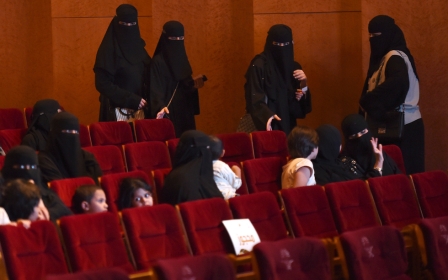These are the top Arab films of 2017

If there's one consistent aspect about Arab cinema, it is its persistent lack of consistency. Coming on the heels of 2016 that saw the likes of Clash, Tramontane, Hedi and The Best of Us storming the world’s biggest film fests, 2017, by comparison, feels like a letdown.
Thanks to the refugee crisis and the ascendance of the right in Europe and the US, Arab films continue to be the flavour of the week, becoming a regular fixture in the world’s top art-house film markets and garnering unprecedented attention from international press.
This year, the vast majority of debutant Arab films were greeted with less enthusiasm by festivals and press alike. Torn between the desire for formal innovation and the fetishistic western demands for habitual political stories, Arab cinema, once again, caved in to the latter, churning out yet another crop of pictures revolving around the same familiar themes: war and armed conflicts, subjection of women, immigration and western exile, and poverty porn.
Censorship has tightened its grip over cinema across the region. At the same time, the blockade imposed on Qatar in June complicated funding opportunities.
Funds from the regional powerhouse cinema hub Doha Film Institute – the most active film fund in the region – have become unofficially forbidden for filmmakers in the UAE, Bahrain, Saudi Arabia and Egypt. Many of the banks in these countries have halted transactions with their Qatari counterparts and governments are closely monitoring filmmakers accepting Qatari money.
Egypt suffered the most in 2017 with a perceptibly reduced festival participation and dwindling in production of independent film.
Gulf cinema continued its futile attempts in producing homegrown social dramas, to negligible results; while Tunisian cinema - which has made enviable strides after the Jasmine Revolution - had a year to forget. Meanwhile, a new brave wave of gay cinema began to emerge, particularly in Lebanon with films such as Anthony Chidiac’s Room for a Man and Mohamed Sabbah’s Chronic. Yet many of the released offerings lacked cohesion.
With a best actor win at the Venice Film Festival, massive receipts at the Lebanese box office and a possible Oscar nomination, Ziad Doueiri’s courtroom drama The Insult is certainly the most successful Arab film of the year - and the most controversial. Its artistic merits, however, are still open to debate.
Amid rising tensions in the region, Palestinian cinema got its mojo back after a lengthy lull, recasting the occupation in an existential contour and cleverly utilising its growing arsenal of star talents.
Another notable aspect of Arab cinema this year is the rise in ranks of female filmmakers. Three of the year’s best films, including the top two, were directed by women at the top of their game, showing remarkable cinematic dexterity and heightened sensibility missing from many of the year’s overbaked works.
All films in the following list took recognisable subjects and gave them original treatments, shedding a new, different light on some of the most pertinent socio-political concerns facing Arabs today. The year’s best Arab films blend experimentation with pathos and perceptiveness with urgency. They are an eclectic, fierce, forward-looking, genre-bending bunch that offset the disappointment of an evolving cinema that continues to startle and frustrate in equal measure.
Here is a list of the top seven Arab films of 2017:
7. Panoptic
Renowned Lebanese sound designer Rana Eid makes her directorial debut with this essay film. It is a city symphony that ranks among the most evocative portraits of modern-day Beirut in recent memory. At once a sober personal family memoir, a reflection on Lebanon’s collective amnesia, and a visual document of a city sprouting beyond recognition.
Eid compensates for the documentary’s various shortcomings (sprawling voiceover and an occasional loss of concentration) with her earnest inquisitiveness and visual flair. Panoptic points toward a much-needed change in direction, as Lebanese cinema has been suffering from a surfeit of civil war stories.
6. Volubilis
The fourth film by Moroccan director Faouzi Bensaïdi, including WWW: What a Wonderful World and Death for Sale, is an unusual pastiche of sorts. It is a turbulent love story between a bumbling security guard and a wistful maid that takes a leaf from Egyptian melodramas - and its classic songbook - and fuses it with political critique.
The result is a colourful, whimsical and violent modern romance that acts as both a stern attack on Morocco’s corrupt ruling elite, and an analysis of wounded machismo. Frequently amusing, occasionally violent and savage, and immensely watchable, Volubilis is another vibrant chapter in one of the most unpredictable careers in Moroccan cinema.
5. The Journey
Iraq’s most celebrated filmmaker Mohamed al-Daradji (Son of Babylon) delivers a heartfelt survey of a post-Saddam Hussein Iraq in this 2006-set quasi thriller. The story centres around a female suicide bomber embarking on a train mission and the miscellaneous characters she comes across along the way.
Constantly oscillating between the sentimentality of Italian neo-realism and stylisation of Hollywood, al-Daradji’s admirably non-judgmental tale is the most classically structured film in this list: a humanistic allegory about a war-torn nation striving for normalcy. Handsomely mounted and genuinely empathetic, al-Daradji’s focus on ordinary Iraqi lives gives the grief-stricken nation a feat denied by the anonymous torrent of news reports: a human face.
4. Of Sheep and Men
After making a big splash on festival circuits with his 2015 documentary short Babor Casanova, Swiss Algerian Karim Sayad graduates to feature filmmaking with this anthropological examination of sheep fights in the working-class neighbourhood of Bab El Oued in the capital of Algeria, Algiers.
Sayad’s peculiar setting and ingenious plot structure - a contest climaxing in Eid al-Adha - gives way for a fascinating, thoughtful study of marginalised lives, toxic male rivalry and the simmering violence of patriarchal Algerian society.
The sheep contest gradually transpires as a metaphor for the civil war whose phantoms continue to haunt a nation still teeming with suppressed fundamentalism and state oppression. In a year short of new stirring voices, Of Sheep and Men - the standout Arab debut of the year – marks Sayad as a talent to be reckoned with.
3. Ghost Hunting
Winner of the best documentary category at this year’s Berlin Film Festival, Andoni’s long-awaited follow-up to the 2009 smash Fix Me has been called sadistic, attention-seeking and pompous.
Andoni is no stranger to controversy, and with Ghost Hunting, the Palestinian documentarian has produced a hugely provocative statement on trauma, captivity and power.
Inspired by the Brazilian Theatre of the Oppressed, Andoni recruits former Palestinian prisoners of the Moskobiya interrogation centre in Jerusalem to play the role of their captors in an imagined film project where unsuspecting actors are subjected to the horrors of the notorious prison.
The barrier between fiction and reality disintegrates, as does the thin line separating the quest for emotional honesty from exploitation. A thought-provoking, highly innovative, multi-layered film that provides no easy answers for the tough questions it asks, Ghost Hunting is a work of devilish brilliance and the year’s best Arab documentary.
2. Le Fort des Fous
Describing the work of French-Algerian Narimane Mari is a daunting challenge. An undistinguishable blend of fiction and non-fiction, of cinematic traditions and video art that investigates the legacy of Algeria’s bloody colonialist past, Mari’s second feature cements her reputation as the region’s foremost experimental filmmaker.
Le Fort des Fous premiered at the 14th edition of the prestigious German exhibition Documenta before taking its festival bow at Locarno in Switzerland.
Divided into three sections that pair the recorded recollections of French colonists - taken from preserved early scientific expeditions - with unsettling contemporary global politics, Mari’s sophomore feature is a dizzying, unclassifiable film with an ambitiously grand scope.
Written texts, improvisations, reenactments and interviews are seamlessly weaved in a fragmented narrative that also borrows elements from theatre to explore the elusive nature of memory, history creation and the destructive impact of imperialism.
1. Wajib
Little in the previous features of Palestinian filmmaker Annemarie Jacir could have prepared us for the magnificence of Wajib, which means "duty" in English, a near-perfect family drama that announces the next stage in the trajectory of Palestinian cinema.
As palpably passionate as they are, Jacir’s prior works, including Salt of this Sea and When I Saw You, were tainted by a mix of blatant, heavy-handed nationalistic sermonising that bordered on demagogy, and structural problems cumulating in a weak third act.
With Wajib, Jacir avoids her past miscalculations, replacing the loud tenor of her prior dramas with notable subtlety, allowing her themes to develop organically throughout the course of the story.
A road movie, the film stars veteran Palestinian thespian Mohammed Bakri in the role of a former Palestinian Liberation Organisation (PLO) fighter, who embarks on a little journey across Nazareth with his estranged architect son (played by Bakri's real life son, Saleh) to hand-deliver the wedding invitations for his daughter.
The pragmatism of the weary father collides with the idealism of the naïve son, as family secrets begin to unravel.
Unlike her previous pictures, Wajib - which won best film and acting at this month’s Dubai Film Festival – is permeated by sense of resignation. The vigour of the fight has been swapped by uncertainty and ethical haziness.
We soon realise the basic act of survival may have been the greatest act of resistance carried out by the father. Deeply engaging, elegantly melancholic and emotionally generous, Wajib is Jacir’s most mature work to date. It is an honest, entertaining panorama of middle class Palestinians elevated by the never-better Bakris whose transfixing chemistry and sizzling charisma makes it a film for the ages.
Middle East Eye propose une couverture et une analyse indépendantes et incomparables du Moyen-Orient, de l’Afrique du Nord et d’autres régions du monde. Pour en savoir plus sur la reprise de ce contenu et les frais qui s’appliquent, veuillez remplir ce formulaire [en anglais]. Pour en savoir plus sur MEE, cliquez ici [en anglais].




